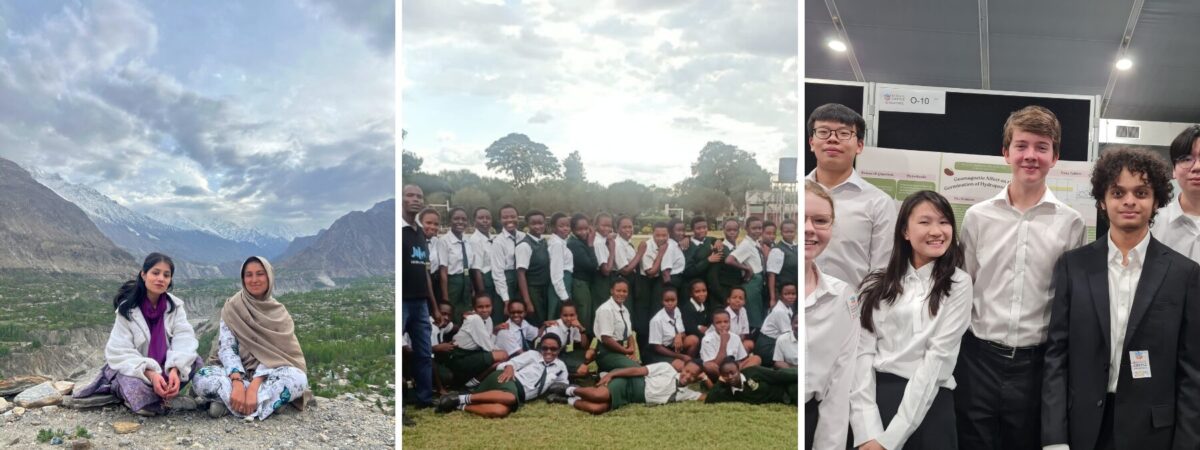
The Amplify Grants, generously sponsored by Ciena, provide students participating in the 2025 YouthMADE Festival with $500 to help them expand or amplify their projects.
A panel of high school students and Digital Promise staff reviewed 62 applications, identifying 17 awardees for a 2025 YouthMADE Festival Amplify Grant. In addition, three applications from the 2024 YouthMADE Festival were awarded grants in the fall of 2024, bringing the total number of grants awarded this year to 20.
Congratulations to all of the recipients for their stand-out applications and meaningful projects in their communities. Learn more about each recipient below:
Student Names: Rusudan, Mia, Mariam, Tamar, Ani
Location: Sachkere, Georgia
“‘Path to Happiness’ is a student-led project that promotes emotional well-being through daily affirmations and anonymous peer support. We created a Georgian-language website where users receive positive messages and can share their problems anonymously. The goal is to spread positivity, reduce loneliness, and create a safe space for youth to express their feelings. The project has already reached local students and teachers, and with support, it can grow to impact more communities across Georgia.” – Rusudan
Student Names: Kanishk, Aaditya, Vishwanth, Hema, Arjun
Location: Siruvani, Coimbatore, India
“Conflicts between humans and animals, particularly elephants, have led to extensive environmental and economic damage, affecting communities that depend on agriculture, forestry, and tourism. Traditional deterrent methods such as fences, trenches, and noise deterrents have been used for decades, yet they come with significant drawbacks.
The Automated Animal Resisting Machine (AARM) presents a revolutionary approach to mitigating these conflicts by utilizing infrasound, a low-frequency sound wave below 20 Hz that is imperceptible to humans but highly effective in influencing animal behaviour. Infrasound plays a crucial role in animal communication, particularly among elephants, which use these signals for long-distance coordination and alert systems. By replicating natural warning signals, AARM provides a non-invasive, humane, and highly efficient method of deterring elephants and other large mammals from entering human settlements without causing distress or physical harm.” – Kanishk
Student Names: Ayush and Neev
Location: Mumbai, India
“The problem in today’s world is that traditional water sources in certain regions around the world are facing scarcity of water, which is still being depleted at an alarming rate. In households around the world, water is usually taken for granted when it is used for daily usage.
Solar Stills provide a sustainable way to help combat this issue of wastage of water, especially gray water. These devices help separate clean and usable water from the brackish and gray water after household use. An existing solution in today’s world includes AISS (in active mode) and PISS (in passive mode) models of solar stills.” – Ayush
Student Name: Mysha
“Chronic wounds affect about 150 million people, particularly the elderly, all around the world. Such wounds are highly susceptible to infections which can further worsen the health of those affected.
“WoundGuard is an infection-risk tracking patch, which through simple criteria gives you an evaluation of how at risk your wound is to contract an infection. It has three sections to factor into account heat, moisture and pH levels to detect early signs of an infection and use colour-changing technology to timely alert the user. Just apply it near your wound and wait till it works its magic.” – Mysha
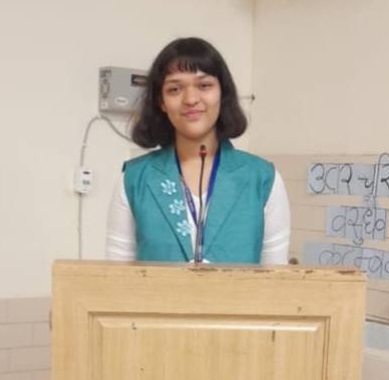
Mysha, the student who created WoundGuard.
Student Names: Goldy and Maudy
Location: Surabaya, Indonesia
“The Reading Aloud Board Game is an innovative educational tool designed to combine the joy of reading with physical activity.” – Mieke Puspita, teacher
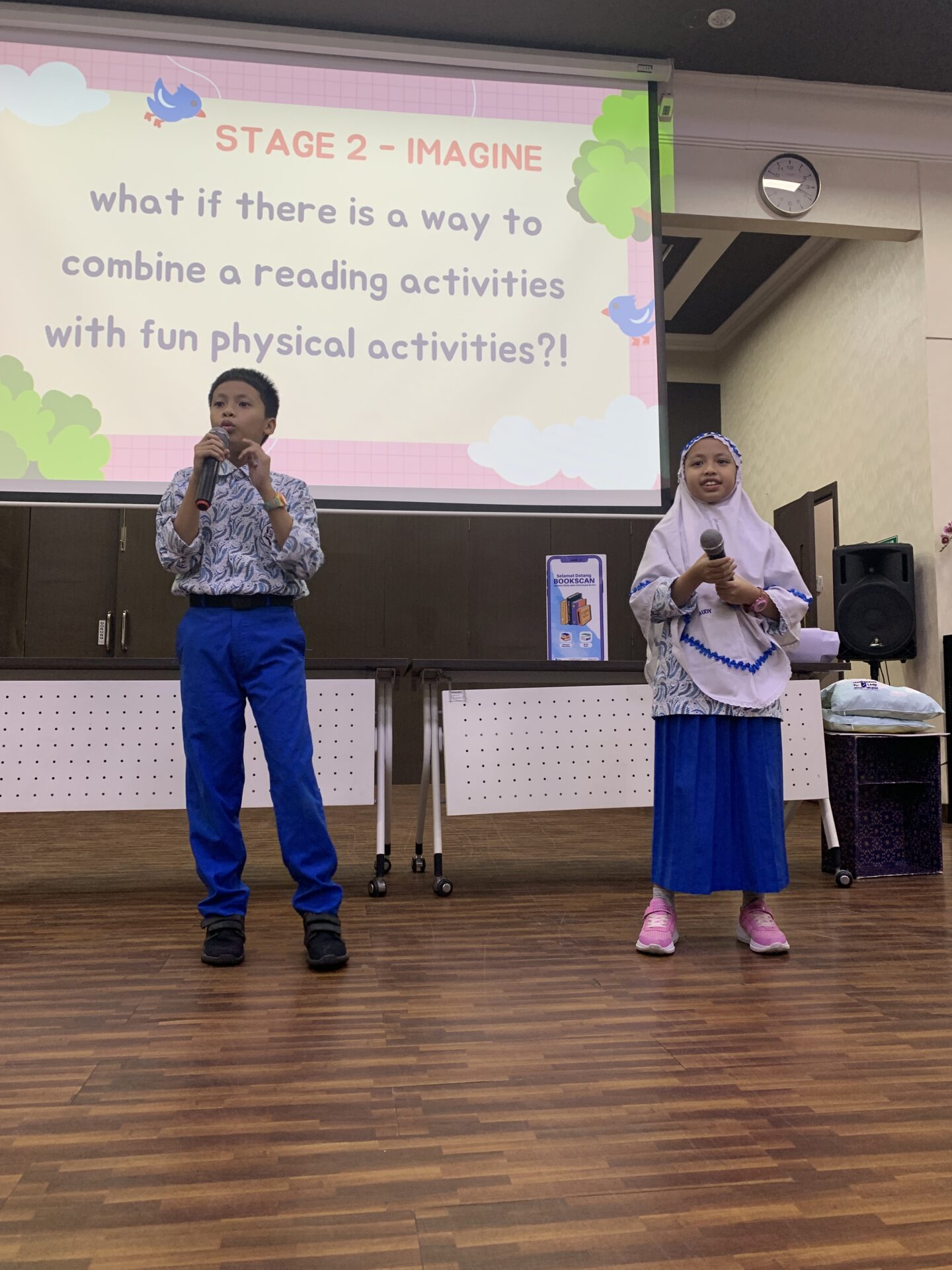
Students Goldy and Maudy
Student Team: Inooro Girls High School Students in Grades 10-12
Location: Nanyuki, Kenya
“Every year, thousands of students in Kenya struggle to attend school due to the lack of proper uniforms, while perfectly good uniforms from graduates go to waste. Mindful Me is a sustainable, tech-driven solution that bridges this gap by connecting students in need with those willing to give back.” – Beldine Atieno, teacher
Student Names: Gracious and Lumadi
Location: Kaimosi, Kenya
“The Smart Dustbin for the Visually Impaired is an assistive technology innovation designed to enhance independence, hygiene, and dignity for individuals with visual impairments. This smart dustbin is equipped with voice guidance and proximity sensors that detect the presence of a person nearby and guide them through the process of safely and easily disposing of waste. The system includes audio feedback, an automatic lid mechanism, and a compact design that is suitable for indoor and outdoor environments such as homes, schools, and public spaces.” – Gracious
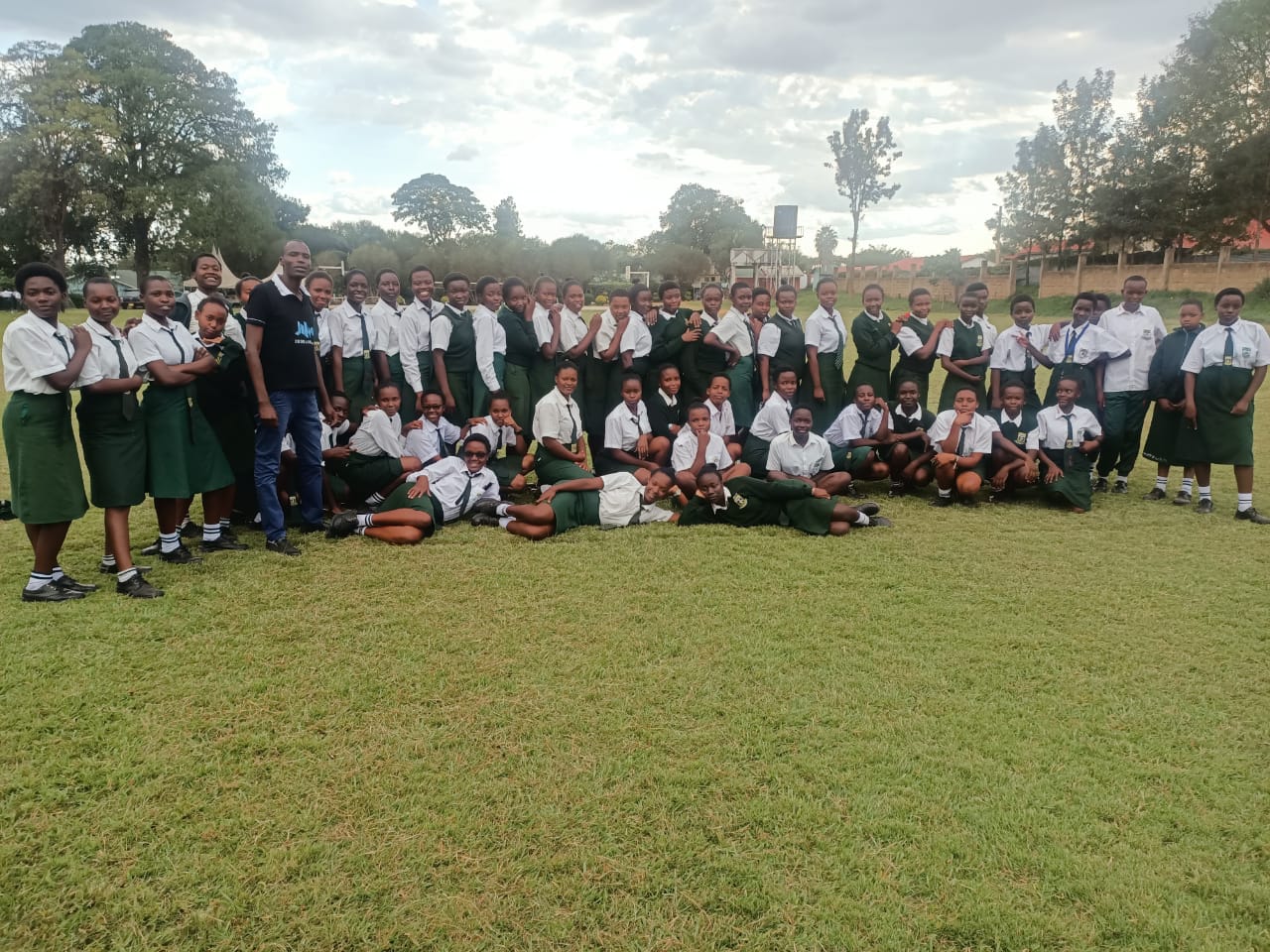
Students at Kaimosi Girls High School
Student names: Siti Nur Hanisah, Azzulfa Haryani Mohd Azri, Aby Prescila Hadily, Nadrah Sari Hamidin, Noorhayanie Mahalan, Omar Hishammuddin Omar Hashim, Sharmie Diana Binti Sazilin
Location: Keningau, Sabah, Malaysia
“Malaysians have been making progress in reducing plastic waste but little effort has been made to reduce, recycle, or upcycle fabric waste which includes clothing, shoes, household textiles, plush toys, backpacks, and more. This rising concern especially in Sabah, an Island Malaysian state, led to the launch of this project known as ‘Mearpet.’ This project intends to help reduce this issue by upcycling old clothes and soft toys into puppets that could be used to entertain and educate children, especially the unfortunate ones. It is a triple-fold project as it offers opportunities for our special needs peers of the dressmaking vocational programme to become workshop trainers who train other students on how to sew fabric into hand puppets and we also guide students on how to write and perform their own puppet shows including individuals with hearing impairments.” – Siti Nur Hanisah
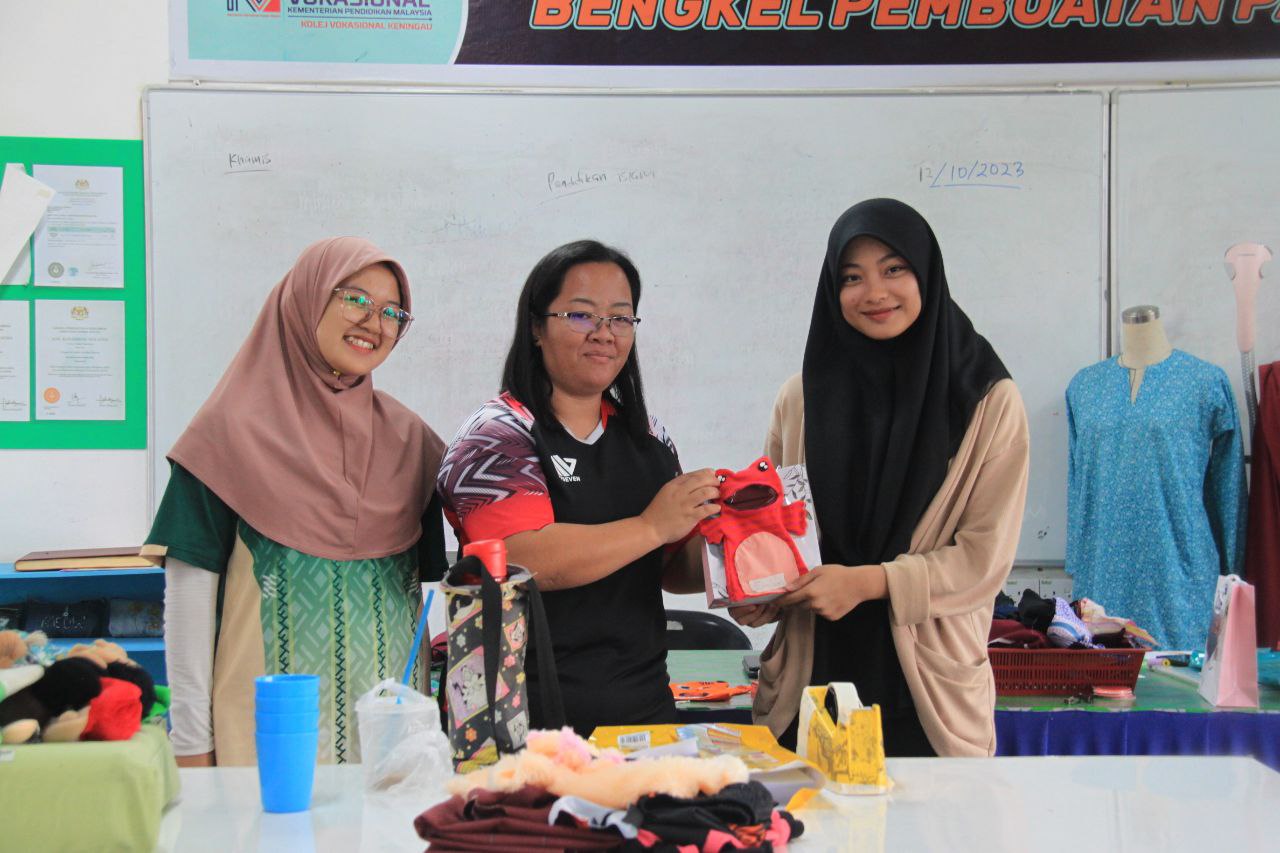
Hanisah and teammates
Student Names: Adam, Hajara, Yunusa, Aliyu, and Muhammad
Location: Yobe State, Nigeria
“Our project, the Abbari Community Solar Borehole and Garden Initiative, is building on an EU-funded solar-powered borehole that’s currently being constructed in our community. This borehole will give clean water to over 200 families, which is a big deal for us because we really need safe drinking water. We want to make the most of this by creating a community garden that uses this water in a sustainable way.
The garden will be a place where people can grow vegetables, fruits, and trees. It’s going to help us come together as a community, give us some economic opportunities by selling what we grow, and help the environment by planting over 100 trees to fight desertification.” – Adam
Student Names: Chizoba and Patrick
Location: Lagos, Nigeria

Students served by the Zoba Advisory
“This project is a Pan-African initiative designed to educate and advocate for clean energy adoption among youth aged 3 to18. It delivers engaging, age-appropriate educational programs that raise awareness about renewable energy sources, sustainability, and climate action. The goal is to empower the younger generation to become informed clean energy advocates within their communities.” – Chizoba
Student names: Caleb British International School Students
Location: Lagos, Nigeria
“The ‘Youth Made Festival 2024 – My Climate Action Story: Thought-Leaders Interview’ is an innovative and inspiring event organized by the Young Entrepreneurs’ Club at Caleb British International School. It serves as a platform to showcase the impactful work of young climate thought leaders and activists, while also providing a space for learning, networking, and collaboration. This event showcases the impact of youths around us whose voices have not been heard before now and whose stories have not been told.” Samuel Awoyemi, teacher
Student Names: Davina, Fiyinfoluwa, Darasimi, and Tamara
Location: Lagos, Nigeria
“Waka-Gen is a kinetic energy innovation designed to convert human footsteps into electricity using piezoelectric technology. The name comes from Nigerian Pidgin English—’Waka’ meaning walk, and ‘Gen’ short for generator. Together, Waka-Gen is the ‘walking generator,’ a decentralized clean energy system embedded in high-footfall surfaces like sidewalks, malls, transport terminals, and school corridors. As people step on Waka-Gen tiles, pressure activates embedded piezoelectric sensors, generating electrical energy that can be stored or directly used.” – Davina
Student Names: Zubia and Laraib
Location: Hunza, Pakistan
“Saheli Station began in 2022, growing from Innovate Educate & Inspire (IEI) Pakistan’s safe space programs in Gilgit-Baltistan known as Saheli Circles. The word ‘Saheli’ means ‘friend’—and that’s exactly what these spaces were meant to be: a place where female friends could gather, learn, discuss, and challenge societal norms.
After a brief pause in 2023, Saheli Station is back—with fresh energy and new leadership. This year, two young advocates from Hunza, both 19 years old, have stepped up to rebrand and relaunch the platform.” – Umaima Mustafa Soomro, Innovation Educate & Inspire Pakistan
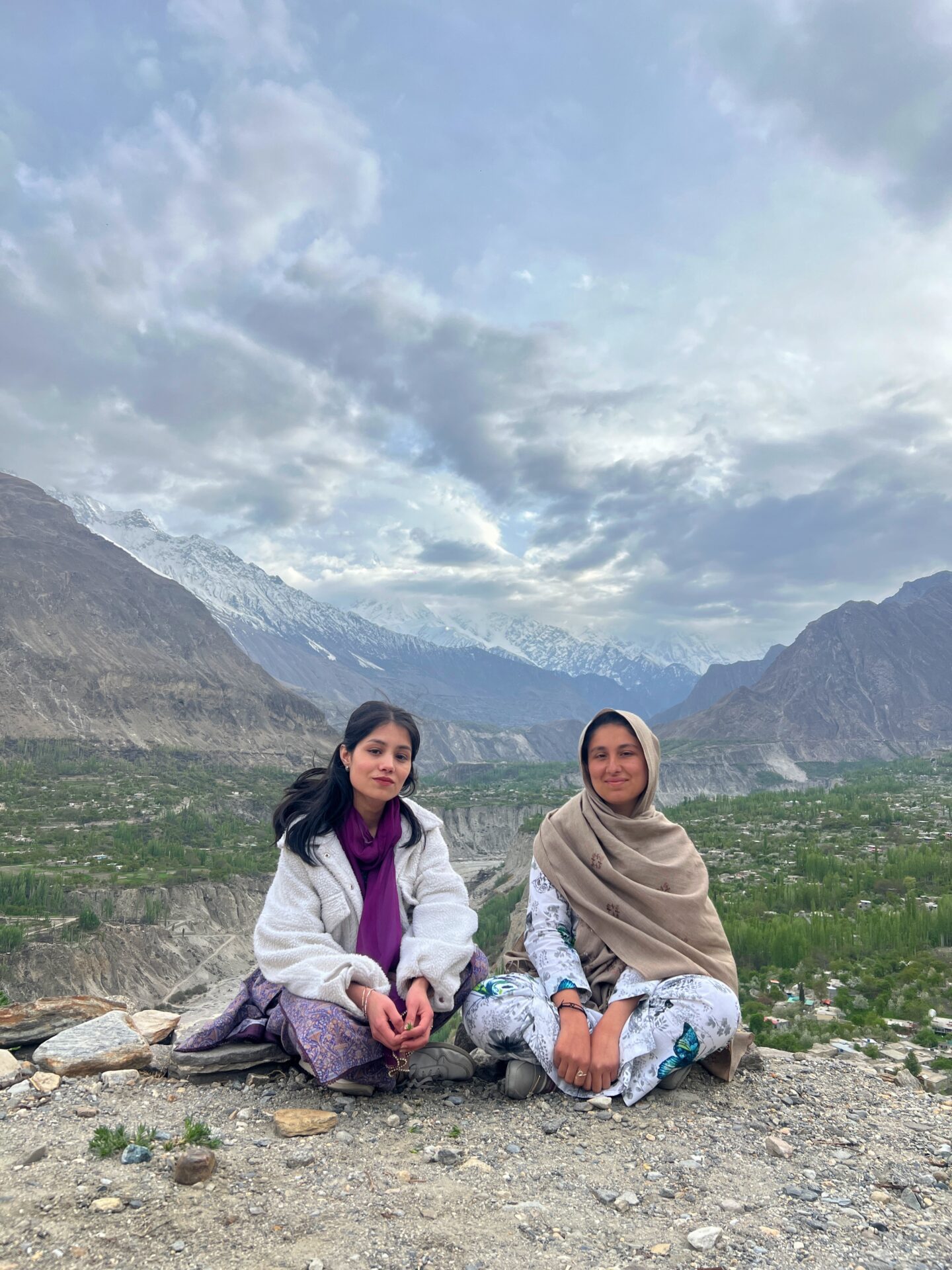
Students Zubia and Laraib
Student Names: Freddie, Arabella, Sien, Krishna, Max, and Gerrick
Location: Singapore
“By 2050, the world’s population is expected to surpass 9 billion, likely spurring economic growth and increased per capita income, but also leading to high food production demand.
Recently, hydroponic systems have gained interest for year-round crop production, enhanced by automation, leading to higher yields than traditional soil-based methods. Magnetic fields have also shown potential to improve crop yields and reduce pests and diseases, though this area requires further research. Magnetized water in hydroponics has increased lettuce yields by over 50%, despite challenges in cost and water treatment longevity. Combination of magnetic fields with hydroponics could boost household food production, with studies showing positive effects on germination and weight of crops like cherry tomatoes and lettuce.” – Student team
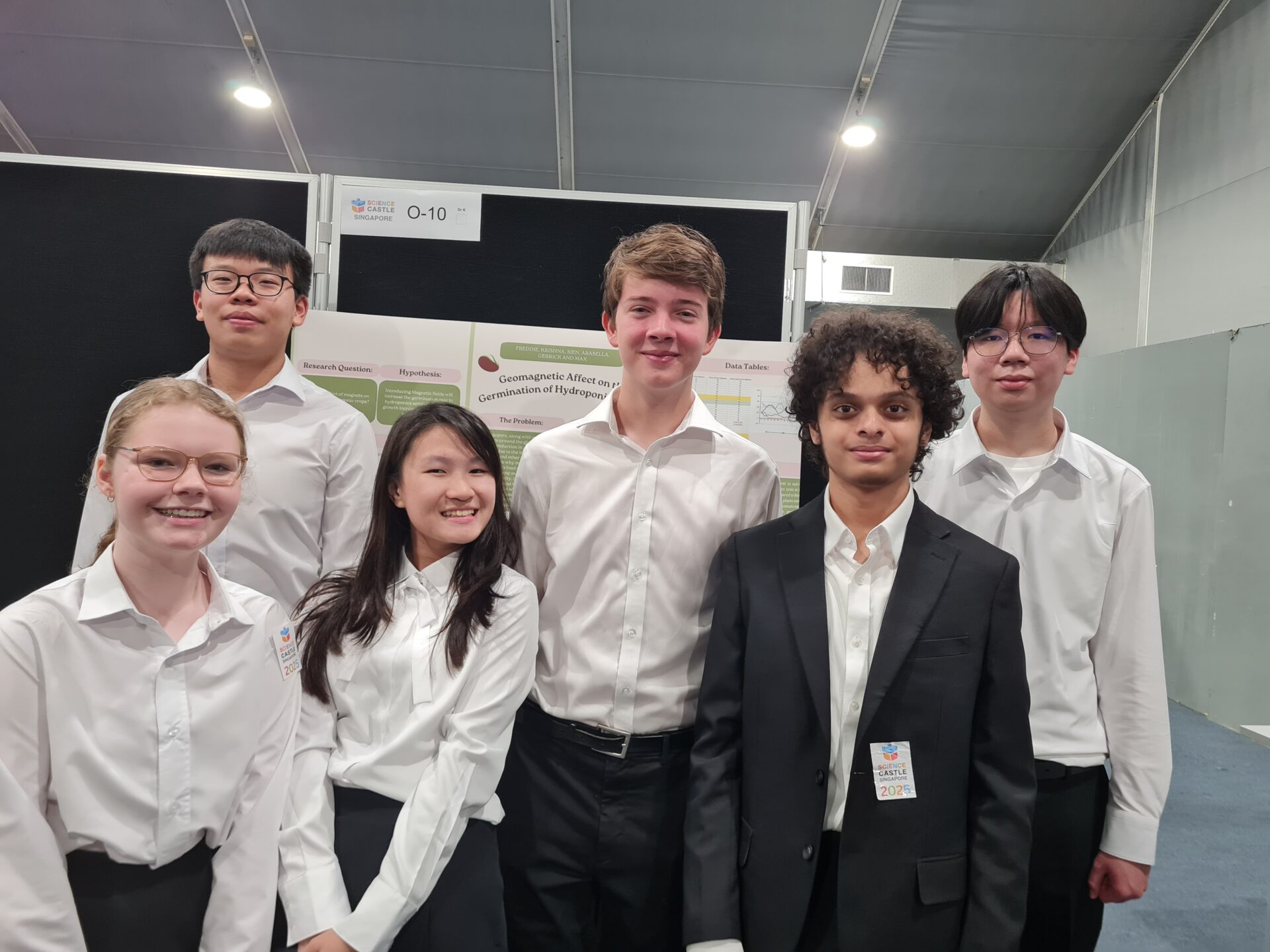
Student team at Nexus International School Singapore
Student name: Anastazia
Location: Katunguru, Tanzania
“Breaking Barriers to Girls’ Education is a community-driven, in-person gathering designed to address the persistent challenges preventing girls in underserved communities from accessing and completing quality education. This initiative brings together a diverse group of stakeholders—including educators, policymakers, community leaders, and youth advocates—in a collaborative space to reflect, strategize, and act on issues of gender inequality in education.”- Anastazia

Students at Nyamtelela Secondary School
Student names: Legaci, Dacia, Judah, Sincere, Lo’Riah, Nandi, Tristan, K’Ari
Location: St. Louis, Missouri
“This year, our scholars took on the challenge of fighting hunger right here in North St. Louis. They started by researching food insecurity and creating a map of grocery stores, food pantries, gardens, and farmers markets across the city. What they found was eye-opening: North St. Louis is a food desert, and many families don’t have regular access to healthy food.That discovery sparked a movement. The students launched a project called Eat Green, Grow Green. It’s all about helping people grow their own food in small spaces—using soil or even hydroponics, which doesn’t require soil at all. They’re currently growing their own garden and learning as they go.” – Cyrhonda Hill, teacher
Student names: Nora Sun and Sai Supriya Chakravadhanula
Location: Olathe, Kansas, and Boston, Massachusetts
“Half of the world’s population lives in nations with fewer than one psychiatrist per 10,000 people. mercuri.world makes mental health resources accessible to everyone. Founded and led by students from Harvard and MIT, mercuri.world is a not-for-profit initiative (fiscally sponsored by Hack Club) that is pioneering innovative digital solutions to global mental well-being. We have reached 6,473 people thus far, through 196 volunteers, internationally.” – Nora Sun
Student Names: Ruth, Arianna, Sofia
Location: Boston, Massachusetts
“NoVasta’s mission is to turn excess into access. Our organization forms partnerships with restaurants and collects their leftover food at the end of the day, donating it to food shelters in the area. By redistributing surplus food from local businesses and restaurants that would otherwise go to waste, we ensure that nutritious meals reach those in need, making a positive impact on both the community and the environment. Beyond donations, NoVasta fosters youth advocacy, empowering students to take an initiative on problems ranging from food economics to nutrition and sustainability by means of online resources and events.” – Ruth
Student Names: Sarah and Ellen
Location: Cedar Park, Texas
“Our project, Waste Warriors: AI Meets the Lunchroom, is a student-led initiative at BASIS Cedar Park designed to tackle cafeteria food waste through innovation, education, and action. We’re combining environmental advocacy with artificial intelligence to build a smarter, greener school—and to inspire others to do the same.” – Student team
Team Name: Young Voices Councils at Teach the Future
“Our project is a youth-led campaign called ‘Dear Teachers, Can We Talk About the Future?’ that connects students, educators, and schools with futures literacy education. Led by the Young Voices Council members aged 12-18, we’re working to become the first youth cohort certified in futures literacy while co-creating a futures literacy curriculum for classrooms in collaboration with Dr. Peter Bishop. The campaign provides resources, training, and support to bring futures thinking into educational settings worldwide.” – Lisa Giuliani, Teach the Future

Youth Advisory Council Members